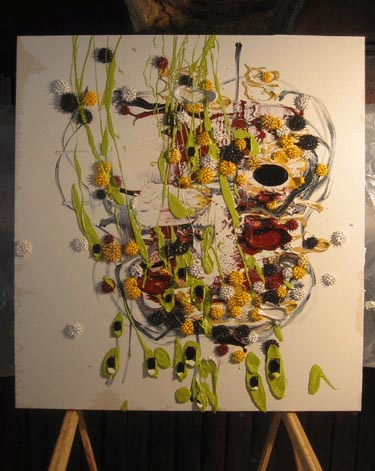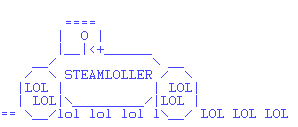View current page
...more recent posts

New Dennis Hollingsworth painting. It's a beaut. I like the suggestion of a head, the unfinished Ryman-esque quality of the edges, and the physics-flouting, flying-off-the-canvas dynamism of the paint. The sensuousness of that thick buttery substance communicates even in pixel form. Yum.

ascii artist unknown
"808 Straight" [mp3 removed]
Some dancefloor-type beats. A mix of hardware and software instruments, analog and digital, but entirely electronic: every sound originated as a voltage.
I haven't been following the Grime scene that closely, but after listening a bit to this site that bloggy recommended, I think I'm in the ballpark with what I'm doing here. I need a fuller bass sound, though, and more dubby beats (that's all). My main influences are still electro, acid house, and a kind of prog sensibility. I'm not that "street." I'd like to work on that.
This dubstep track "Midnight Request Line" by Skream is excellent.
Update: bumped the volume on "808 Straight" slightly.
Variety, July 20, 2020: Linklater to Give Scanner "Makeunder" Using Original Footage
"It hasn't held up over the years," admits the sexagenarian erstwhile slacker Richard Linklater, now one of Hollywood's leading directors, speaking of his 2006 film A Scanner Darkly. "I don't know why I let them talk me into using those damn filters for everything," he says. "That digital rotoscoping technique was momentarily cool in the early '00s, but let's face it, it made Winona Ryder look cretinous in some shots. Her features were sliding all over her face. Woody, too," he adds, referring to the late Woody Harrelson, who also played "Munson" in Kingpin.
Film fans agree. "The rotoscoping technique was just wrong for that material," says blogger Joe Chip, who had a brief cameo in the film. "Take the scene where Keanu Reeves addresses the Rotary Club," Chip says. "He's wearing a suit that digitally scrambles his features, masking his identity. It's a dramatic, surreal effect, but the problem is, with that rotoscoping technique, everyone in the room looks like they're wearing a scramble suit."
That scene and others are being re-edited to remove the digital effects except where they're needed to advance the plot--such as in the "hallucination sequences" where Reeves imagines his housemates as giant insects. Other film buffs are ecstatic about the proposed changes. "Robert Downey, Jr. did some of his best work in the picture," says director Arnold Kott. "It was a riff on his creep in Altman's Short Cuts, and you hated to see his talent buried under all that faux-artistic, Photoshop-like filtering."
But others don't think the changes will make any difference. "Linklater and Dick weren't the right fit," says Bruno Bluthgeld, a scholar of Philip K. Dick, whose book the movie was based on. "Scanner was an interesting mistake the way Cronenberg's Crash was. The novels were rooted in their eras, and just as the Swinging London sexual licentiousness of the J.G.Ballard book made no sense in the post-AIDS '90s, Scanner was a tale of the late '60s/early '70s, when a generation came down off a psychotropic high and got gobsmacked by harder stuff. This was an anachronism in 2006, when the drug blight du jour was meth labs in the sticks. And not that it should matter, but the rootless addiction hell Dick went through isn't comparable to Linklater's student experiences crashing on couches in Austin, TX."
We'll know soon enough: the newly scrubbed Scanner is due out in 2021.
